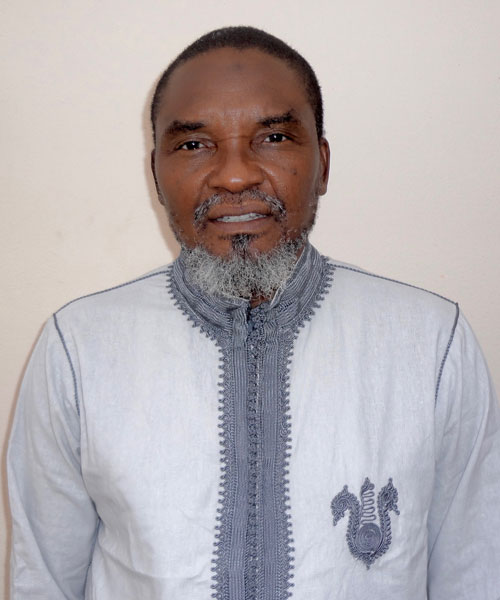Mahouton Norbert Hounkonnou, a 2004 TWAS Fellow and a professor of mathematics and physics at the University of Abomey-Calavi in the Republic of Benin is the recipient of the 2016 C.N.R. Rao Prize for scientific research.
Hounkonnou was honoured for the outstanding level of his research in mathematics and his sustained commitment to mathematics education. His research in advanced theoretical fields finds application in many other disciplines, including physics, oceanography, health, management of water and ecosystems, climate studies and energy issues.
The announcement was made on Monday 14 November in Kigali, Rwanda, during the opening ceremony of the 27th General Meeting of TWAS, The World Academy of Sciences. The C.N.R. Rao prize, generously offered by TWAS Founding Fellow and former Academy President C.N.R. Rao, is a recognition bestowed to scientists from Least Developing Countries whose scientific research has a high-impact.
"The C.N.R. Rao prize is one of the most prestigious prizes awarded by TWAS. For me it is an important recognition of more than 20 years of research activity," said Hounkonnou. "At the same time, it is a sort of encouragement and motivation to continue in the same direction, doing good research and promoting younger people in science. It serves to consolidate my scientific authority. It is also a stimulus to continue to pursue excellence in science."
Hounkonnou is an accomplished mathematician dealing with noncommutative and nonlinear mathematics, nonassociative algebras, nonlinear systems, noncommutative field theories and geometric methods in physics. He was the first to provide a brilliant resolution to some mathematical problems. He receives the prize "for his incisive work on noncommutative and nonlinear mathematics and his contribution to world-class mathematics education."
His passion for mathematics dates back to the years he spent at secondary school, under the supervision of teachers who motivated him on the importance of mathematics in life. In addition, as he explained: "I belong to a family where eldest brothers and sisters are scientists, so they also contributed to build in me a passion for mathematical sciences, including theoretical physics."
Hounkonnou is a member of the International Association of Mathematical Physics, American Mathematical Society, African Academy of Sciences and the UNESCO Scientific Board for International Basic Sciences Programme. He is also a visiting professor at African, Asian, European and North American universities, and the supervisor of more than 32 PhD and 31 MSc students from Belgium, Benin, Burkina-Faso, Burundi, Cameroon, Democratic Republic of Congo, Niger, Nigeria, Senegal, Togo and Zambia.
He is the founder of the International Chair in Mathematical Physics and Applications (ICMPA-UNESCO Chair) of the University of Abomey-Calavi, which selects African students from over 13 French- and English-speaking countries to follow graduate programmes that attract prominent and leading mathematicians.
PhD programmes offered at ICMPA intertwine mathematics and physics. "We need mathematical and physical science and we need people who are well-trained in mathematics, because studies in mathematics and physics have reflections in all the fields where technical, physical and mathematical expertise is needed," Hounkonnou explained. Leading mathematicians and mathematical physicists visit ICMPA to give lectures and supervise student’s research. This has substantially increased international collaboration with African, Asian, American, European and Indian scholars.
Hounkonnou has authored and edited many books. Further, he has refereed and served as an associate editor for journals in mathematics, mathematical physics and theoretical physics. He has published over 150 main research papers in ISI-ranked journals and international conference proceedings in the fields of mathematics, mathematical physics and theoretical physics.
"I enjoy training mathematicians and physicists because the challenges of the African continent require solid capacity building. Our continent needs technology, engineering, and mathematical sciences," he said. "Training in mathematical physics prepares students to eventually move into a career in almost any of the areas where technical, physical and mathematical expertise is, at present, in high demand."
"A solid background in this field can be a springboard for entering the domains of computer science, information processing technology, financial mathematics or even investment and management science, and more generally mathematical modelling of just about any physical, biological, epidemiological and human process."
Training in mathematical physics, he added, not only gives students a broad education in problem-solving, it also equips them with a repertoire of mathematical models of the physical world, which opens up a broad spectrum of applications to many other disciplines.
As Hounkonnou explained, coastal erosion, illnesses, population dynamics, transport phenomena, control of irrigation systems, climate change and environmental issues, fluid dynamics, fishering processes, forestry, can be understood through mathematics.
In recent years, in collaboration with researchers of the French Research Institute for Development (IRD) acting in Benin, his investigations focused on modeled mixed-layer salinity balance in the Gulf of Guinea, to explain seasonal and interannual variability, causes for the recent increase in sea surface salinity in the north-eastern Gulf of Guinea.
The research also applies to malaria infections in Benin: "We applied mathematical modelling to study anopheles, the main vector of malaria risk, using environmental and climate variables. We also performed models to understand the influence of local environmental factors on malaria transmission in Benin and its implications for broader studies."
About the C.N.R. Rao Prize
The C.N.R. Rao Prize was established in 2006 by TWAS founding Fellow and former TWAS President C.N.R. Rao, an eminent Indian chemist who has served as the chairman of the science advisory council to the Prime Minister of India (2004 - 2014). The prize aims at acknowledging distinguished scientists from the world's scientifically lagging and Least Developed Countries who have made significant contributions to global science.
The prize carries a cash award of USD5,000 generously provided by professor Rao. Each of TWAS's five Regional Offices presents one candidate from eligible countries of that region. TWAS officers review the nominations and propose a winner for approval by professor Rao.
Previous winners are: Bishal Nath Upreti, Nepal (2015); Muntaser Eltayeb Ibrahim, Sudan (2014); Firdausi Qadri, Bangladesh (2013); Wendimagegn Mammo Deneke, Ethiopia (2012); Akissa Bahri, Ghana/Tunisia (2009); Maurice Tchuente, Cameroon (2008); Berhanu M. Abegaz, Ethiopia and Philippe Rasoanaivo, Madagascar (2006).

